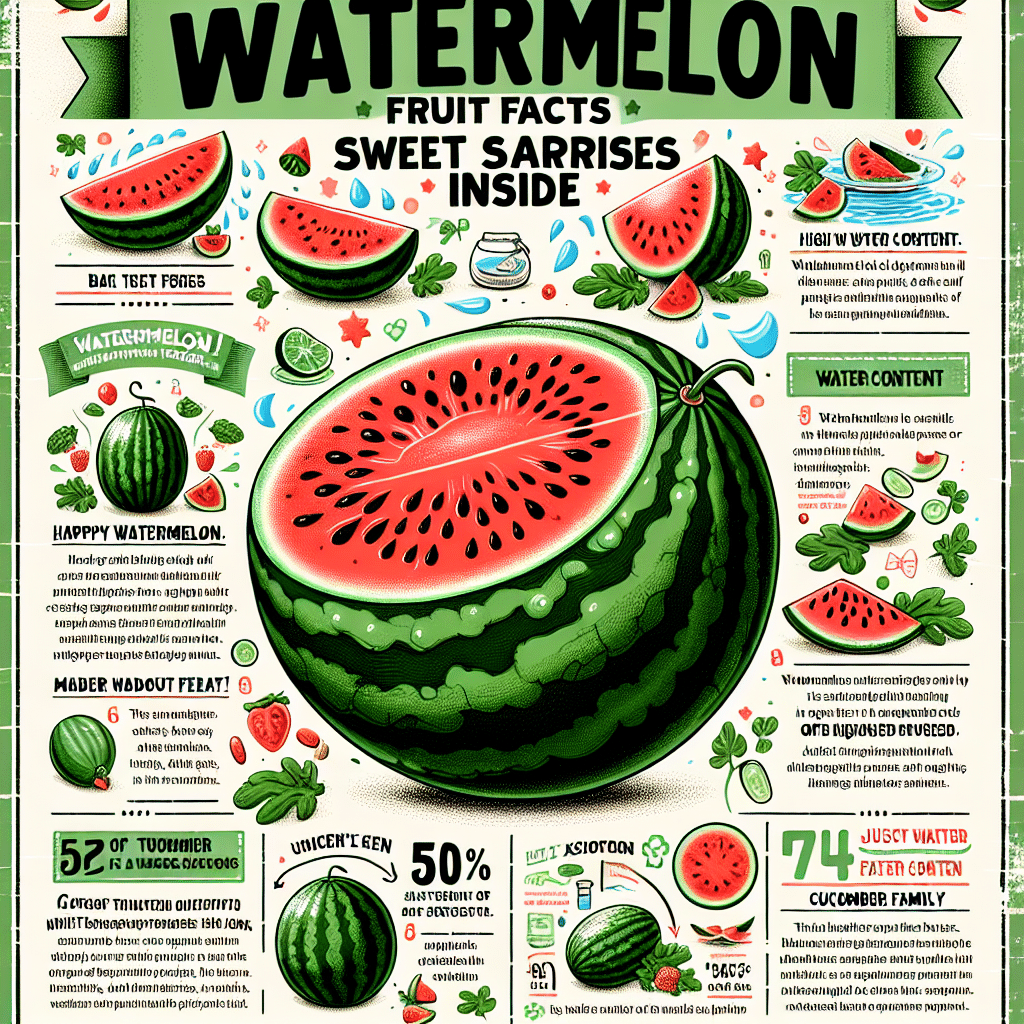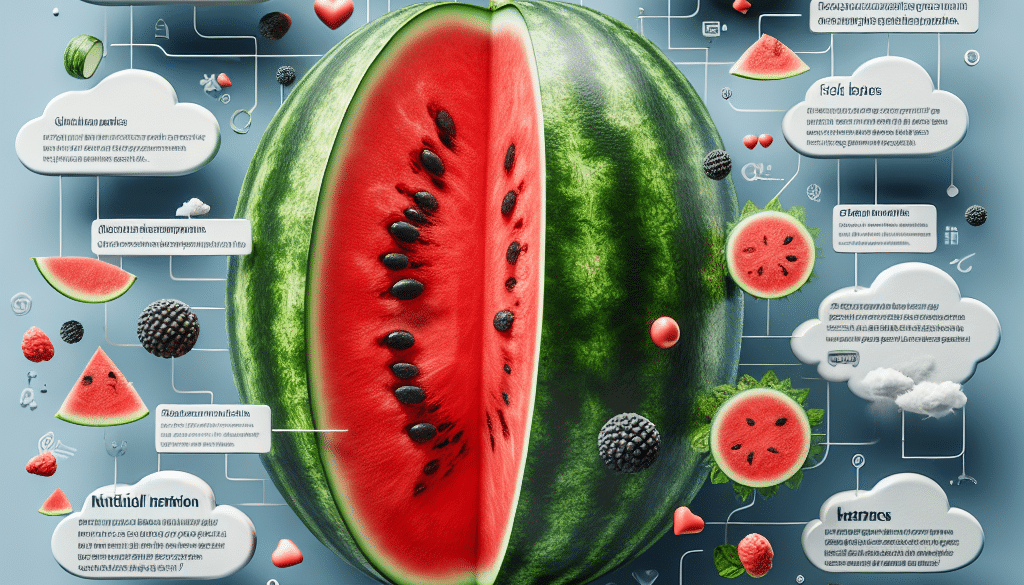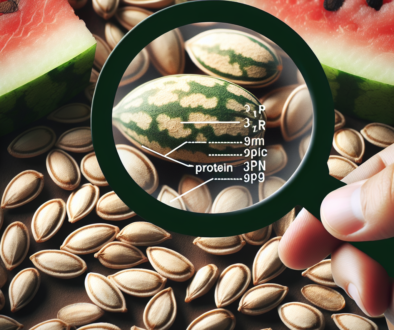Watermelon Fruit Facts: Sweet Surprises Inside
-
Table of Contents
- Watermelon Fruit Facts: Sweet Surprises Inside
- The Origins and History of Watermelon
- Watermelon Varieties and Cultivation
- Nutritional Profile of Watermelon
- Health Benefits of Watermelon
- Unexpected Uses and Cultural Significance
- Environmental Impact and Sustainability
- Conclusion: The Wonders of Watermelon
- Discover the Power of Watermelon Seed Protein with ETprotein
Watermelon Fruit Facts: Sweet Surprises Inside

Watermelon is not just a refreshing summer fruit; it’s a fascinating subject of study with a wealth of surprising facts and benefits. This article delves into the world of watermelons, revealing the sweet surprises that lie within its green rind and juicy red flesh. From its origins and varieties to its nutritional profile and unexpected uses, watermelon is a fruit that continues to intrigue and delight.
The Origins and History of Watermelon
Watermelon’s journey began in Africa, where it is believed to have originated. Historical records, including Egyptian hieroglyphics, suggest that watermelons have been cultivated for consumption for over 4,000 years. The fruit was not only a source of hydration in arid regions but also held cultural significance, often placed in the burial tombs of kings to nourish them in the afterlife.
From Africa, watermelons spread to other parts of the world. By the 10th century, they were being cultivated in China, which is now the world’s largest producer of watermelons. The Moors introduced the fruit to Europe in the 13th century, and it eventually made its way to the Americas with African slaves and European colonists.
Watermelon Varieties and Cultivation
Today, there are over 1,200 varieties of watermelon, ranging in size, shape, color, and taste. These varieties can be broadly categorized into four groups:
- Seeded watermelons: The traditional type with black seeds.
- Seedless watermelons: Developed in the 1990s, they have gained popularity for their convenience.
- Mini watermelons: Smaller in size, they are perfect for personal consumption.
- Yellow/orange watermelons: Known for their distinct color, they are just as sweet as the red varieties.
Watermelon cultivation requires warm temperatures and a long growing season. The fruit is mostly water—about 92%—which explains why it thrives in sunny climates with well-drained soil. Farmers typically plant watermelon seeds in rows, allowing ample space for the vines to spread out as they grow.
Nutritional Profile of Watermelon
Watermelon is not only delicious but also packed with nutrients. It is low in calories and contains no fat or cholesterol, making it an ideal snack for those looking to maintain a healthy weight. Here are some key nutritional highlights:
- Vitamin C: Essential for immune system support and skin health.
- Vitamin A: Important for eye health and immune function.
- Potassium: Helps regulate blood pressure and fluid balance.
- Lycopene: An antioxidant linked to heart health and cancer prevention.
- Amino acids: Contains citrulline, which may improve blood flow and reduce muscle soreness.
Moreover, watermelon is hydrating and can help meet your daily fluid needs, which is especially beneficial during hot weather or after exercise.
Health Benefits of Watermelon
The health benefits of watermelon are as plentiful as its water content. Regular consumption of watermelon has been associated with several positive health outcomes:
- Hydration: Its high water content helps keep the body hydrated.
- Heart health: Lycopene and other antioxidants may help lower cholesterol and blood pressure.
- Inflammation reduction: Anti-inflammatory properties can help reduce oxidative stress.
- Digestive health: Watermelon’s water and fiber content aid in promoting healthy digestion.
Studies have also suggested that watermelon may have potential benefits for athletic performance due to its citrulline content, which can improve endurance and reduce muscle soreness.
Unexpected Uses and Cultural Significance
Watermelon is not just for eating. Its rind can be pickled or candied, and the seeds are often roasted and eaten as a snack. In some cultures, watermelon juice is a popular beverage, and the fruit is used in a variety of recipes, from salads to sorbets.
Culturally, watermelon has played a role in various traditions and festivals around the world. In the United States, watermelon is synonymous with summer and Independence Day celebrations. In Japan, the Suika-wari game, where participants try to split open a watermelon while blindfolded, is a popular summer activity.
Environmental Impact and Sustainability
The cultivation of watermelon can have both positive and negative environmental impacts. On the one hand, watermelon plants can improve soil health by acting as cover crops that prevent erosion. On the other hand, watermelon farming can be water-intensive, which may not be sustainable in regions with water scarcity.
However, farmers are adopting more sustainable practices, such as drip irrigation and integrated pest management, to reduce water use and minimize the environmental footprint of watermelon cultivation.
Conclusion: The Wonders of Watermelon
Watermelon is a fruit that offers more than just a sweet taste. Its rich history, diverse varieties, and impressive nutritional profile make it a fascinating subject for exploration. The health benefits of watermelon, from hydration to heart health, are significant, and its versatility in culinary uses and cultural significance add to its allure. As we continue to learn about this fruit, it’s clear that the surprises inside a watermelon are as delightful as they are beneficial.
Discover the Power of Watermelon Seed Protein with ETprotein
While enjoying the juicy flesh of watermelons, don’t overlook the potential of their seeds. ETprotein, a leading watermelon seed protein manufacturer, harnesses the nutritional power of these seeds to create high-quality protein products. Watermelon seed protein is a sustainable and vegan-friendly option that offers a neutral taste and is free from common allergens.
ETprotein’s product range extends beyond watermelon seed protein to include other plant-based proteins like rice, pea, pumpkin, sunflower, mung bean, and peanut proteins. These products cater to various industries, including food and beverage, sports nutrition, and health and wellness.
For those interested in incorporating watermelon seed protein into their diet or product offerings, ETprotein is the go-to source. With a commitment to quality and customer satisfaction, ETprotein stands out as a trusted supplier in the global market.
About ETprotein:
ETprotein, a reputable watermelon seed protein Chinese factory manufacturer and supplier, is renowned for producing, stocking, exporting, and delivering the highest quality organic bulk vegan protein and plant proteins. They include Organic rice protein, clear rice protein, pea protein, clear pea protein, watermelon seed protein, pumpkin seed protein, sunflower seed protein, mung bean protein, peanut protein etc. Their offerings, characterized by a neutral taste, non-GMO, allergen-free attributes, cater to a diverse range of industries. They serve nutraceutical, pharmaceutical, cosmeceutical, veterinary, as well as food and beverage finished product distributors, traders, and manufacturers across Europe, USA, Canada, Australia, Thailand, Japan, Korea, Brazil, and Chile, among others.
ETprotein specialization includes exporting and delivering tailor-made protein powder and finished nutritional supplements. Their extensive product range covers sectors like Food and Beverage, Sports Nutrition, Weight Management, Dietary Supplements, Health and Wellness Products, and Infant Formula, ensuring comprehensive solutions to meet all your protein needs.
As a trusted company by leading global food and beverage brands and Fortune 500 companies, ETprotein reinforces China’s reputation in the global arena. For more information or to sample their products, please contact them and email sales(at)ETprotein.com today.












